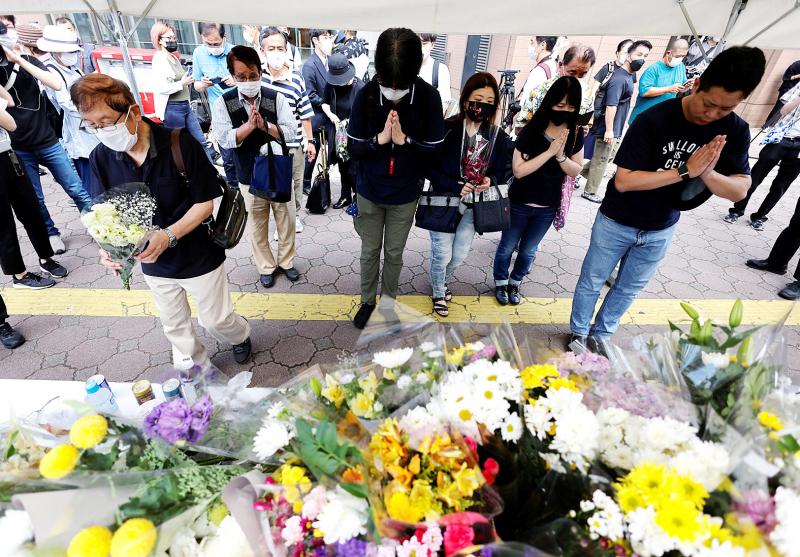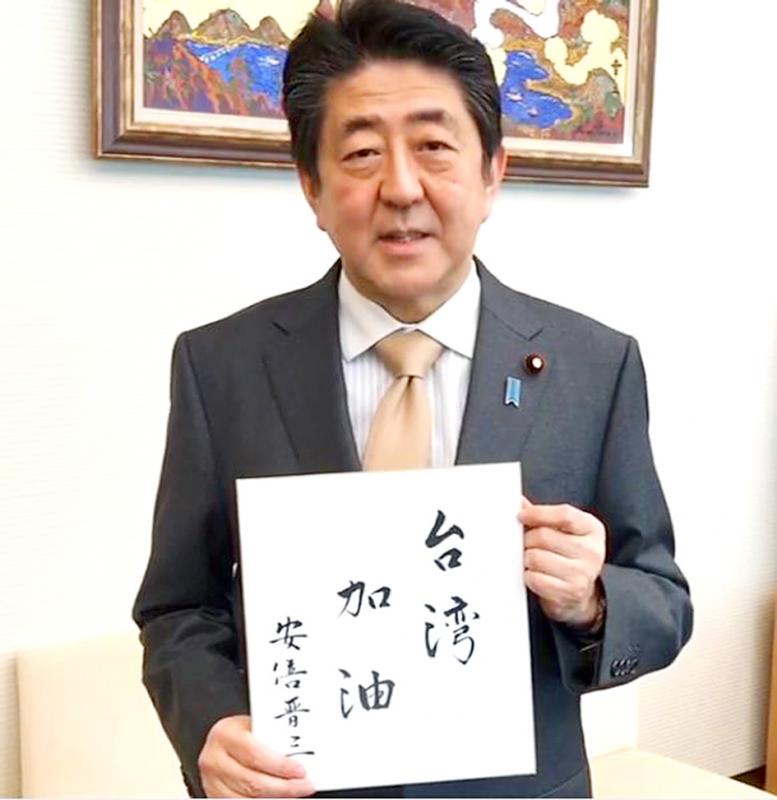The assassination of former Japanese prime minister Shinzo Abe — in whom Taipei found a trusted ally — is undoubtedly a great loss for the nation.
Throughout his political career, Abe had done much to wake the international community to the threat of a Chinese invasion of Taiwan, which he worked ceaselessly to prevent.
“A Taiwan emergency is a Japanese emergency, and therefore an emergency for the Japan-US alliance,” Abe told an online forum held by the Taipei-based Institute for National Policy Research in December last year.

Photo: Reuters
In an opinion piece published by Project Syndicate in April, Abe called on the US to end its long-standing policy of “strategic ambiguity” over Taiwan, saying it fosters “instability in the Indo-Pacific region, by encouraging China to underestimate US resolve, while making the government in Taipei unnecessarily anxious.”
Abe had long recognized that China’s hegemonic rise posed a threat to security in the Asia-Pacific region.
As early as 2007, while serving his first term as prime minister, Abe touted the idea that the Indian and Pacific oceans form a single geostrategic unit. This concept would give rise to the Free and Open Indo-Pacific strategy, which Abe unveiled as the guiding principle of his foreign policy in 2016.

Photo: Screen grab from Shinzo Abe’s Facebook page
That framework has since been adopted in various capacities by the governments of Australia, India, the US and others in the region.
Abe had also perceived weakness in Japan’s national defense. Japan’s constitution limits exercising the right of collective self-defense to a narrow set of circumstances that could impede the ability of the US-Japan alliance to respond to crises in the region.
Abe sought to authorize the use of the Japan Self-Defense Forces in foreign conflicts by launching initiatives to reinterpret Article 9 of the constitution and pass Japan’s Legislation for Peace and Security.
The efforts were met with a storm of criticism from pacifists in Japan, who accused Abe of seeking to revive militarism and military conscription. The controversy culminated in calls for his resignation and protesters reportedly placed figurines of the prime minister on roads to be crushed by vehicles.
Shifts in power in the region would prove him right. China’s constant parade of warships and military aircraft have stoked regional tensions and laid bare the depth of Beijing’s ambitions to Taiwan and Japan.
In retrospect, Abe’s persistence — which gave Japan the much-needed legal authority to respond to military conflict in the Taiwan Strait — showed audacity and vision rarely seen in Japanese politicians today.
Abe stepped down as prime minister in 2020, citing a recurrence of ulcerative colitis, a condition he had said contributed to him stepping down in 2007 after just one year in office during his first term.
Just one year after retirement, he continued his high-level political engagement, taking over the leadership of the Liberal Democratic Party’s biggest faction, Seiwa Seisaku Kenkyukai.
Abe also gave numerous speeches at public forums and campaign events that addressed Japan’s security environment, the need to bolster national defense and amending the constitution.
Abe’s remarks over the past two years — especially the widely reported Taiwan emergency speech — likely played a key role in reshaping public opinion in Japan. More than 90 percent of Japanese now believe their country should plan for a “Taiwan emergency,” a Nikkei poll released last month showed.
To Taiwan, Abe had been a tested friend, a powerful intercessor and perhaps most importantly, the statesman who all but brought the country into the fold of the US-Japan mutual cooperation and security framework.
Translated by Jonathan Chin

HORROR STORIES: One victim recounted not realizing they had been stabbed and seeing people bleeding, while another recalled breaking down in tears after fleeing A man on Friday died after he tried to fight the knife-wielding suspect who went on a stabbing spree near two of Taipei’s busiest metro stations, Taipei Mayor Chiang Wan-an (蔣萬安) said. The 57-year-old man, identified by his family name, Yu (余), encountered the suspect at Exit M7 of Taipei Main Station and immediately tried to stop him, but was fatally wounded and later died, Chiang said, calling the incident “heartbreaking.” Yu’s family would receive at least NT$5 million (US$158,584) in compensation through the Taipei Rapid Transit Corp’s (TRTC) insurance coverage, he said after convening an emergency security response meeting yesterday morning. National

Taiwan has overtaken South Korea this year in per capita income for the first time in 23 years, IMF data showed. Per capita income is a nation’s GDP divided by the total population, used to compare average wealth levels across countries. Taiwan also beat Japan this year on per capita income, after surpassing it for the first time last year, US magazine Newsweek reported yesterday. Across Asia, Taiwan ranked fourth for per capita income at US$37,827 this year due to sustained economic growth, the report said. In the top three spots were Singapore, Macau and Hong Kong, it said. South

PLANNED: The suspect visited the crime scene before the killings, seeking information on how to access the roof, and had extensively researched a 2014 stabbing incident The suspect in a stabbing attack that killed three people and injured 11 in Taipei on Friday had planned the assault and set fires at other locations earlier in the day, law enforcement officials said yesterday. National Police Agency (NPA) Director-General Chang Jung-hsin (張榮興) said the suspect, a 27-year-old man named Chang Wen (張文), began the attacks at 3:40pm, first setting off smoke bombs on a road, damaging cars and motorbikes. Earlier, Chang Wen set fire to a rental room where he was staying on Gongyuan Road in Zhongzheng District (中正), Chang Jung-hsin said. The suspect later threw smoke grenades near two exits

The Forestry and Nature Conservation Agency yesterday launched a gift box to market honey “certified by a Formosan black bear” in appreciation of a beekeeper’s amicable interaction with a honey-thieving bear. Beekeeper Chih Ming-chen (池明鎮) in January inspected his bee farm in Hualien County’s Jhuosi Township (卓溪) and found that more than 20 beehives had been destroyed and many hives were eaten, with bear droppings and paw prints near the destroyed hives, the agency said. Chih returned to the farm to move the remaining beehives away that evening when he encountered a Formosan black bear only 20m away, the agency said. The bear